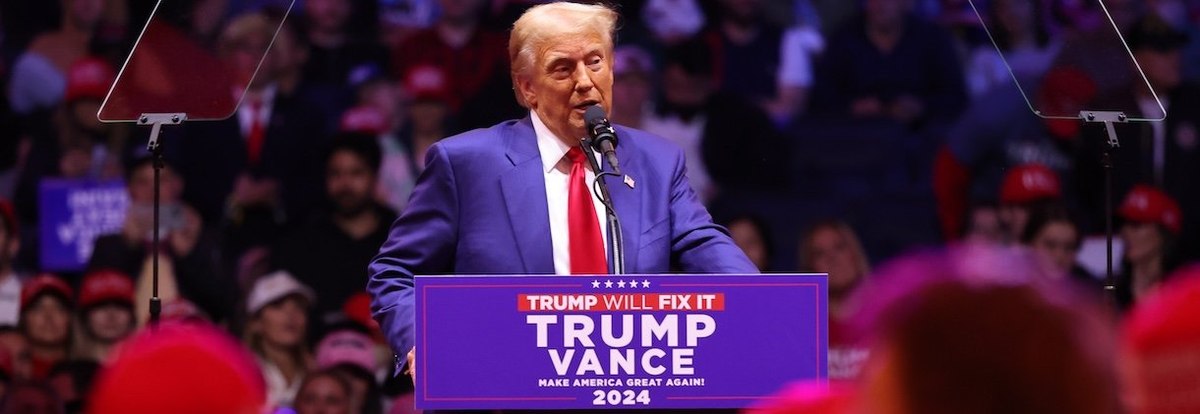This week’s Economist/YouGov poll covers Donald Trump's second term, Joe Biden's presidency, the economy, wildfires, and territorial acquisitions.
Donald Trump's second term
- With Donald Trump on the verge of beginning a new four-year term as president, Americans have divided feelings
- 47% of U.S. adult citizens say they're either enthusiastic (31%) or satisfied but not enthusiastic (16%) about the next four years with Trump as president; 45% say they're either upset (31%) or dissatisfied but not upset (13%)
- Republicans are somewhat more likely to be enthusiastic (71%) than Democrats are to be upset (60%)
- 57% of men under 45 are either enthusiastic or satisfied about Trump's impending term while 35% are upset or dissatisfied
- 43% of women 45 or older are either enthusiastic or satisfied about Trump's impending term while 51% are upset or dissatisfied
- 47% of Americans strongly or somewhat approve of how Trump has handled his presidential transition, while 36% strongly or somewhat disapprove
- Most Republicans approve (86%) while few Democrats do (17%)
- Most Americans say Trump's presidential inauguration on January 20 is very likely (48%) or somewhat likely (29%) to occur peacefully; only 12% say it's not very likely or not likely at all that there is a peaceful transition of power
- The January 16 - 19, 2021 Economist / YouGov Poll, taken not long after the storming of the U.S. Capitol on January 6, 2021, found less confidence in a peaceful transition: 20% said a peaceful transfer of power was very likely and 29% said it was somewhat likely
- Joe Biden leaves office next week as a relatively unpopular president
- 39% of Americans view Biden very or somewhat favorably, while 58% view him very or somewhat unfavorably
- This makes Biden less popular than Trump just before Trump left office in 2021, soon after the January 6 attack; at that time, 41% of Americans had a favorable opinion of Trump and 55% had an unfavorable opinion
- Biden's own favorability has dropped since January 2021, when 49% of Americans viewed him favorably and 44% viewed him unfavorably
- Half of all Americans say Biden will go down in history as a poor (32%) or below average (18%) president; just 20% say he will go down as an outstanding (7%) or above average (14%) president
- Republicans are much more likely to say Biden's presidency will go down as poor (61%) than Democrats are to say it will go down as outstanding (19%); 5% of Democrats say it will be considered poor
- 39% of Americans view Biden very or somewhat favorably, while 58% view him very or somewhat unfavorably
- More than half of Americans (55%) say Biden's administration had either many major scandals (30%) or a major scandal or two (25%)
- More Americans (69%) said in January 2021 that Trump's administration had many major scandals (48%) or a few (20%)
- A greater share of Democrats (55%) say Biden's administration was largely free of scandals than the share of Republicans who said in 2021 that Trump's administration was largely scandal-free (45%)
- An earlier YouGov survey asked Americans to describe in their own words what Joe Biden's biggest accomplishments and failures as president were, if any. We narrowed these responses down to a list of ten frequently mentioned accomplishments and failures, and asked respondents in the latest Economist survey which of these best described their views.
- Americans are most likely to cite COVID-19 response and recovery (12%) and student debt forgiveness (11%) as the biggest accomplishments of Biden's presidency, among 10 options offered
- The border and immigration (23%) and inflation (17%) are most likely to be cited as Biden's biggest failures, among 10 possibilities offered on the poll
- The largest share of Democrats (15%) cite Biden's decision to run for a second term
- 42% of Americans say Biden accomplished less than they expected in office, while 16% say he accomplished more than they expected and 32% said he did about what they expected
- Americans felt more positively about Trump's first-term accomplishments in January 2021; at that time, 25% said Trump accomplished less than they expected, 36% said Trump accomplished more than they expected, and 27% say Trump accomplished about what they expected
The economy
- Most Americans have a dim view of the current U.S. economy; far more U.S. adult citizens say the economy is poor (35%) or fair (29%) than say it's good (25%) or excellent (7%)
- Americans are more likely to say they've heard mostly negative news about the economy (37%) than that they've heard mostly positive news (12%)
- Overall views of the economy have only changed moderately in recent months; the share of Americans who say the economy is poor is similar to the share who said that in late October (35% vs. 38%)
- While overall views of the economy have been relatively stable, opinions of Democrats and Republicans have moved in opposite directions since Donald Trump was elected president on Nov. 5, 2024
- In late October, 73% of Republicans said the economy was getting worse and 6% said it was getting better; now, 42% of Republicans say the economy is getting worse and 12% say it's getting better
- Democrats' views also have changed, though less dramatically: The share saying the economy is getting worse has risen from 16% in October to 30% now, while the share saying it's getting better has fallen from 42% to 32%
- That Americans should change their stated views on the economy when the party of the president is due to change is expected from past trends. After Joe Biden won the 2020 election, Republicans swiftly became more negative about the economy, while Democrats became more positive
- Compared to changes after the 2020 election, though, partisan views on the economy have shifted less dramatically since the 2024 election
- Over the nine weeks between Election Day 2020 and Inauguration Day 2021, Republicans went from being 42 percentage points more likely than Democrats to say the economy was getting better to 4 points more likely
- Over the equivalent time period since the 2024 election, Democrats have gone from being 24 points more likely than Republicans to say the economy was getting better to 21 points more likely
- Although Republicans haven't yet changed their mind much on the state of the economy, they're much more likely to be hopeful for the near future, while Democrats have become less hopeful
- The share of Republicans expecting their households to be financially better off a year from now has doubled to 54%, from 27% before the election; the share of Democrats saying this has fallen to 26% from 42%
Wildfires and climate change
- Most Americans (74%) have heard a lot about recent wildfires in Southern California; 22% have heard a little about the wildfires, and only 3% have heard nothing at all
- Even among Americans who say they hardly ever follow news about current events, 44% have heard a lot about the wildfires and only 11% have heard nothing
- 62% of U.S. adult citizens say climate change is at least somewhat responsible for recent wildfires; 28% say it's not at all responsible
- 11% say climate change is "entirely responsible" for the wildfires, and another 24% say it's "mostly responsible"
- A majority of Democrats (63%) say climate change is mostly or entirely responsible; just 16% of Republicans say so
- Belief that the climate is changing is widespread: 60% of Americans, 86% of Democrats, and 39% of Republicans say the world's climate is changing as a result of human activity
- Just 6% of Americans say the climate isn't changing
- Among those who believe humans are changing the climate, 50% say climate change is mostly or entirely responsible for recent wildfires; 8% of them say climate change isn't responsible
- Majorities of Americans who say the climate is changing but not because of humans (65%) or that the climate is not changing (80%) say climate change is not at all responsible for recent wildfires
Territorial acquisitions
- More Americans oppose than support each of three recent proposals by Donald Trump to seek control of the Panama Canal, Greenland, or Canada
- 33% of U.S. adult citizens support seeking ownership of the Panama Canal, while 42% oppose this and 25% aren't sure
- 28% of Americans support seeking ownership of Greenland, while 47% oppose this and 25% aren't sure
- Just 18% support the U.S. seeking ownership of Canada, while 60% are opposed
- Republicans are more likely than Democrats to support all three proposals, as well as a fourth Trump idea — to rename the Gulf of Mexico the "Gulf of America" (24% of Americans support this and 55% oppose it)
- More Americans support than oppose granting statehood to the U.S. territory of Puerto Rico (45% support, 28% oppose) or to Washington, D.C. (39% support, 33% oppose)
- Democrats are more likely than Republicans to support statehood for both Puerto Rico and Washington D.C.
- Very few Americans support the U.S. using military force to take control of the Panama Canal, Greenland, or Canada
- Of the 33% who support the U.S. seeking ownership of the Panama Canal, only 36% support using military force to take the canal, while 48% of the group oppose military force
- Few support using military force to take over Greenland (23% of pro-annexation Americans) or Canada (29% of pro-annexation Americans)
- Overall, 12% of Americans say they support both trying to take over the Panama Canal and using force to do so; 6% say that about Greenland and 5% do about Canada
Race relations
- Monday is Martin Luther King Jr. Day, marking the birthday of the civil-rights leader who was assassinated in 1968; 56% of Americans say his birthday should be a federal holiday and 23% say it should not be
- 77% of Democrats and 40% of Republicans say King's birthday should be a federal holiday
- 80% of Americans have a very or somewhat favorable view of King, including 89% of Democrats and 76% of Republicans; 11% of Americans have an unfavorable view
- Two-thirds (67%) of Americans believe racism is a big problem (32%) or somewhat of a problem (35%) in society today — including 91% of Democrats and 46% of Republicans
- 1% of Democrats and 15% of Republicans say racism is not a problem in society
- Only 38% of Americans say that a great deal (12%) or quite a bit (27%) of King's dream of racial equality has been realized today — including 34% of Democrats and 50% of Republicans
- Half (50%) of Americans say race relations have gotten better since the 1960s while 22% think they have gotten worse
- Democrats and Republicans think similarly about changes in race relations since the 1960s: 50% of Democrats and 56% of Republicans say they have gotten better, while 21% of Democrats and 19% of Republicans say they have gotten worse
- 15% of Americans say race relations in the U.S. have gotten better during Joe Biden's presidency while 31% say they have gotten worse
- That's slightly better than in January 2024, when 12% said race relations during Biden's presidency had gotten better and 39% said they had gotten worse
- Compared to their evaluations of race relations under President Biden, Americans are slightly likelier to expect changes in both directions under Trump's second term: 23% expect race relations to get better, while 42% expect them to get worse
Throughout this report, some numbers may appear to be off by 1 because of rounding
— Carl Bialik and Taylor Orth contributed to this article
See the toplines and crosstabs for the January 12 - 14, 2025 Economist/YouGov Poll
Methodology: The poll was conducted among 1,558 U.S. adult citizens. Respondents were selected from YouGov’s opt-in panel to be representative of U.S. adult citizens. A random sample (stratified by gender, age, race, education, geographic region, and voter registration) was selected from the 2019 American Community Survey. The sample was weighted according to gender, age, race, education, 2024 presidential vote, 2020 election turnout and presidential vote, baseline party identification, and current voter registration status. 2024 presidential vote, at time of weighting, was estimated to be 48% Harris and 50% Trump. Demographic weighting targets come from the 2019 American Community Survey. Baseline party identification is the respondent’s most recent answer given around November 8, 2024, and is weighted to the estimated distribution at that time (31% Democratic, 32% Republican). The margin of error for the overall sample is approximately 3.5%
Image: Getty (Michael M. Santiago / Staff)
What do you think about the election, American politics in general, and everything else? Have your say, join the YouGov panel, and get paid to share your thoughts. Sign up here.












